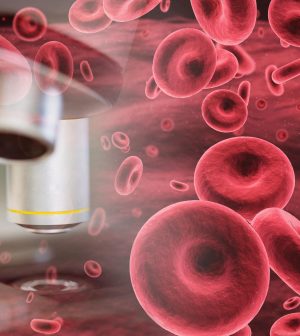- The Long-Term Effects of Daily Turmeric Supplements on Liver Health
- Could Your Grocery Store Meat Be Causing Recurring UTIs?
- Are You Making This Expensive Thermostat Error This Winter?
- Recognizing the Signs of Hypothyroidism
- 10 Strategies to Overcome Insomnia
- Could Artificial Sweeteners Be Aging the Brain Faster?
- Techniques for Soothing Your Nervous System
- Does the Water in Your House Smell Funny? Here’s Why
- Can a Daily Dose of Apple Cider Vinegar Actually Aid Weight Loss?
- 6 Health Beverages That Can Actually Spike Your Blood Sugar
Patients Over 80 Still Benefit From Treatment for AML Blood Cancer

Seniors over 80 with acute myeloid leukemia can safely and effectively take the standard targeted therapy for the blood cancer, a new study finds.
The oral drug venetoclax is typically given to older AML patients whose bodies can’t handle the rigors of chemotherapy. The drug targets a protein in cancer cells that helps them live longer than they should.
It’s often combined with a hypomethylating agent that boosts the body’s cancer-fighting abilities, to form a combo therapy called VEN-HMA.
“Our study reveals that a significant portion of these patients at the extremes of older age still derive benefit from the VEN-HMA regimen — which is the standard of care for older AML patients and those who are ineligible to receive intensive chemotherapy,” said researcher Dr. Justin Watts, a hematologist with the University of Miami’s Sylvester Comprehensive Cancer Center.
“While acknowledging it certainly isn’t for everyone, we hope our findings encourage health care providers to thoughtfully explore all treatment avenues for elderly patients with AML, rather than prematurely resorting to HMA alone, best supportive care or hospice care,” Watts added in a university news release.
Acute myeloid leukemia starts in the bone marrow, and most often quickly moves into the blood, the American Cancer Society says. From there, it spreads aggressively to other parts of the body.
For the study, researchers analyzed electronic medical records from 154 patients with AML treated with VEN-HMA between March 2015 and April 2022 at six hospitals in the United States and Italy.
The average age of the patients was 82. About 77% had been newly diagnosed with AML while 10% had relapsed or hard-to-treat AML.
About 20% to 25% of all treated patients experienced prolonged survival, which encompassed roughly 40% of those who responded to the treatment.
Average overall survival for patients who responded to the treatment was 13.2 months, compared to an average 8.1 months across the entire group, researchers found.
At about eight months follow-up, 23% of patients remained in remission, while 20% were still receiving treatment, researchers said.
Death rates within 30 and 60 days of treatment were 8.5% and 17%, comparable to earlier clinical trials with the combination therapy, researchers said.
This treatment can reduce the bone marrow’s ability to produce healthy blood cells and weaken the immune system, researchers noted.
Because of this, they suggest reducing the dosage and duration of treatment for some.
“Unlike typical adult AML cases, these patients exhibit lower tolerance to venetoclax, suggesting that they may benefit from a reduced dosage,” Watts said.
The new study was published May 9 in the journal Blood Neoplasia.
More information
The American Cancer Society has more on acute myeloid leukemia.
SOURCE: American Society of Hematology, news release, May 9, 2024
Source: HealthDay
Copyright © 2026 HealthDay. All rights reserved.










